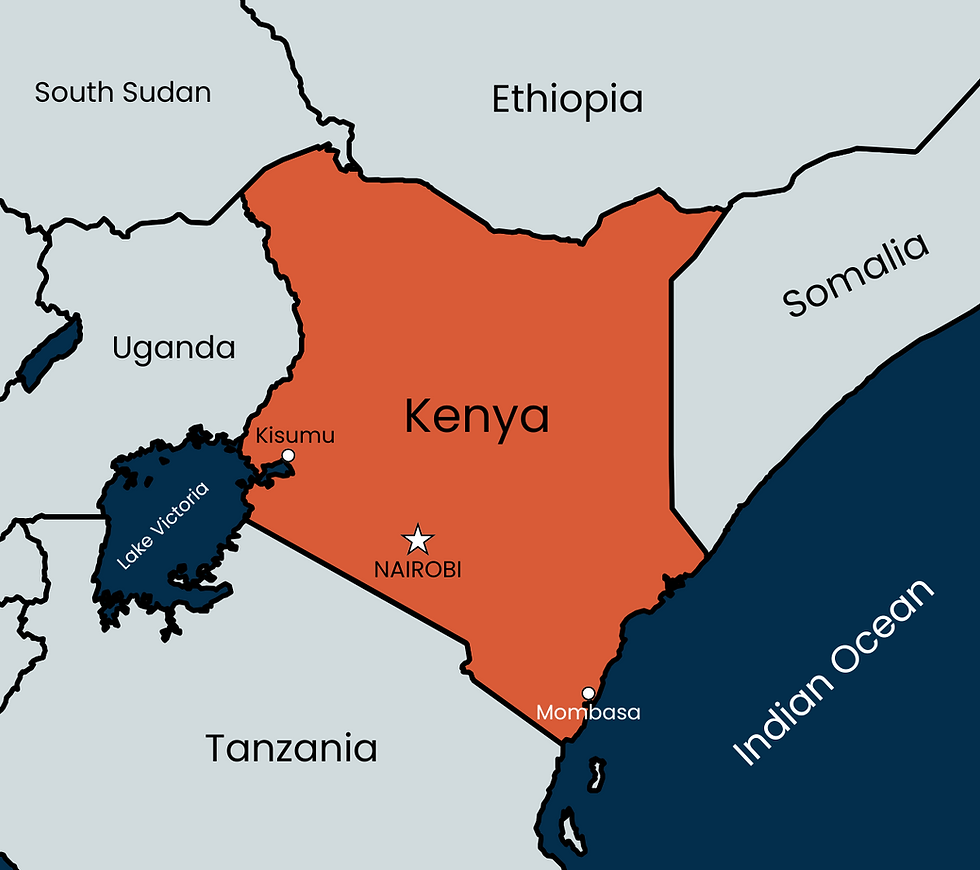Intel Brief: Widespread protests in Kenya escalate
- Jun 25, 2025
- 3 min read
Updated: Jul 18, 2025

Date: 25/06/2025
Where?
Kenya; Nairobi, Mombasa, Kisumu, Nakuru, Nyahururu, Kisii and more.
UPDATE: 26/06/2025
As of this morning, 16 deaths have been reported since protests erupted across Kenya yesterday. Amnesty Kenya, along with the Kenya National Commission on Human Rights (KNCHR), confirmed that most fatalities were caused by police action. At least five victims were fatally shot.
Additionally, over 400 individuals have been reported injured.
The KNHCR on their official X-account, mentions heavy police deployment and "excessive use of force, including rubber bullets, live ammunition and water cannons, resulting in numerous injuries".
The rising death toll signals escalating tensions and raises concerns about further instability if grievances are not urgently addressed.
What happened?
On 25/06/2025, Kenyans took to the streets to commemorate the one-year anniversary of the deadly 2024 ‘Gen Z’ protests against the widely unpopular tax bill, which culminated in the storming of the Kenyan parliament.
Protesters on the streets demand the resignation of Kenyan President William Ruto, like a year ago. A trending hashtag on X is #OccupyStateHouse, a call for protesters to march to the official residence of the president. #RutoMustGo is also trending on Kenyan social media.
On the internet, such as on X and on Telegram, videos can be found showing serious unrest. In multiple Kenyan cities, riot police are present in big numbers, using tear gas, water cannons, and firing rubber bullets in an attempt to disperse protesters.
Also on 25/06/2025, the Kenyan Communications Authority banned live broadcasts of the countrywide protests on the basis that it ‘incites to violence’. Some TV stations, like the privately owned KTN TV appear to ignore the live broadcast ban. Fears also exist of a wider internet shutdown.
Currently, protests have spread to at least 20 of the 47 counties.
Analysis
These events unfold against the backdrop of the mysterious death of Albert Ojwang, a famous Kenyan blogger who exposed the country’s security forces, accused for years of extrajudicial killings and disappearances. On 06/06/2025, Ojwang was arrested for allegedly defaming Kenya’s Deputy Inspector General of Police, Eliud Lagat, on social media. He was then transported over 350 kilometers to Nairobi, where he died in police custody. Following his death, massive protests erupted across Kenyan cities, leading to violent clashes between protesters and security forces on 17/06/2025, on which one person died after reportedly being struck in the head at point-blank range by a rubber bullet fired by police, further intensifying unrest on the streets.
The planned protests on 25/06/2025 therefore only intensified an already volatile situation, making the escalation that followed inevitable. The police appear to be employing increasingly forceful tactics to suppress protests, utilizing tear gas and aggressive crowd control measures. Videos shared on platforms such as Telegram and X reveal chaotic scenes in downtown Nairobi, Mombasa and other major cities, where mostly young protesters face heavily armed security forces.
The protests in Kenya, which came to be known as the ‘Gen Z protests’, are intensifying. Demonstrators demand the resignation of President William Ruto, and calls to march to his residency go around on social media. They reflect a deep frustration, mainly among young Kenyans (hence the name) with their country’s governance. They highlight police brutality going unpunished, rampant corruption, and people’s fear that President Ruto is dismantling Kenyan democracy. Ruto’s decision to prohibit live broadcasting of the protests fuelled such allegations. Aside from that, Kenya’s economy is struggling, partially due to IMF demands, which adds to the widespread frustration about the situation in the country.
Conclusion
Kenya’s Gen Z-protests reflect a widespread frustration under the Kenyan population about systemic issues in their country. A harsh police response, meant to quell the dissent, appears to only escalate the situation further. How the government chooses to respond further will significantly influence the future of civic engagement and governance in the country. The situation remains fluid, with both the authorities and protesters showing no signs of backing down.
For travellers, keep in mind that the situation in Kenya is very volatile right now, not just in Nairobi. It is advised to proceed with caution, if a decision is made to travel to the country. Expect delays and a heavy police presence in urban centers. Make your presence known with your embassy, and stay up-to-date on the latest news. There are currently no disruptions in aviation, nor are they expected.
Dyami Services
Security is not a luxury but a necessity. With Dyami Security Intelligence as a Service, you gain a proactive, flexible, and affordable solution to manage risks, monitor geopolitical threats, and respond immediately to crises.
Want to know more? Visit our security-as-a-service page!



